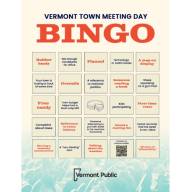For most workers, being offered a raise or promotion is good news. But for others, the increased income means losing thousands of dollars in benefits for themselves and their families.
This situation is called the benefits cliff. It’s what happens when increased income causes the loss of public assistance including food, housing, medical, and heating fuel support. Neck of the Woods, Waitsfield, is working to ensure its employees can navigate this cliff.
“And a small raise can mean losing a lot, when just a few extra dollars a month bumps you over the income limits to qualify,” explained Sarah Galbraith of the Green Mountain United Way which partnered with other organizations to bring the program to Neck of the Woods.
“It's a real-life scenario for thousands of working Vermonters, and more often women. When the choice is between financial stability for you and your family or moving ahead, it's not hard to imagine what many people choose. Choosing not to advance to avoid the loss of benefits means people are held back, workplaces lose talent, and the workforce is destabilized,” Galbraith explained.
Green Mountain United Way created a card game simulating the experience of the benefits cliff. Working Bridges brought that game and training to Neck of the Woods, where staff and board members learned what the benefits cliff is, how it feels to navigate it, and what to do about it.
The training was part of a six-month pilot program that brings Working Bridges to Neck of the Woods at no cost to the child care center, with support from the Early Childhood Fund. It is a merged program between United Way of Northwestern Vermont and Green Mountain United Way.
Working Bridges partners with employers in northern Vermont to bring resource coordinators to worksites so that any employee experiencing financial strain or crisis, including navigating the benefits cliff, can get help. Support can include help with debt management or budgeting, connection to financial assistance and community resources public programs, small-dollar assistance for car or home repairs, help with medical bills and health care navigation, housing, food and meals, and referral to bank products such as Income Advance Loans or Pathways checking accounts.
“The team works to support the employers as well, who seek the program as a benefit to their staff and as a tool to stabilize the workforce. When employees are financially well, they experience increased productivity, better performance, higher job satisfaction, and improved attendance. Training workshops are also available for business owners, human resources staff, and administrators, so that they can be better informed and supported with tools to help staff,” Galbraith said.
“The strength of the Working Bridges program is having someone in your corner who’s easy to reach and experienced in navigating complex systems,” said Rebecca Baruzzi, Fayston, who is the Working Bridges Resource coordinator.
You might also like













